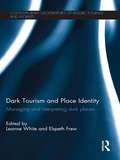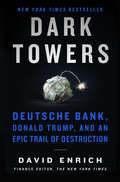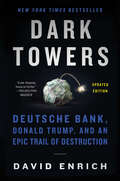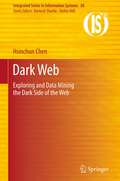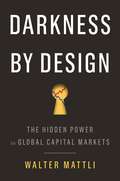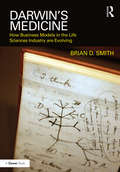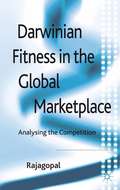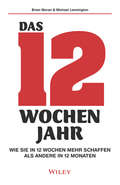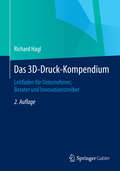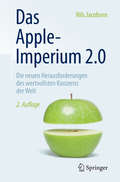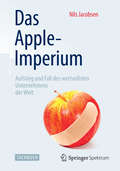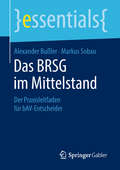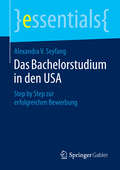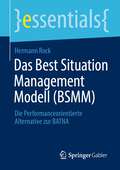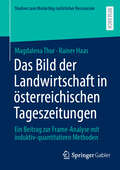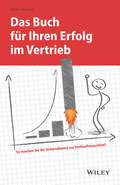- Table View
- List View
Dark Tourism and Place Identity: Managing and interpreting dark places (Contemporary Geographies of Leisure, Tourism and Mobility)
by Leanne White Elspeth FrewDark Tourism, including visitation to places such as murder sites, battlefields and cemeteries is a growing phenomenon, as well as an emergent area of scholarly interest. Despite this interest, the intersecting domains of dark tourism and place identity have been largely overlooked in the academic literature and this book aims to fill this void. The three main themes of Visitor Motivation, Destination Management and Place Interpretation are addressed in this book from both a demand and supply perspective by examining a variety of case studies from around the world. This edited volume takes the dark tourism discussion to another level by reinforcing the critical intersecting domains of dark tourism and place identity and, in particular, highlighting the importance of understanding this connection for visitors and destination managers. Written by leading academics in the area, this stimulating volume of 19 chapters will be valuable reading for postgraduate and advanced undergraduate students in a range of discipline areas; researchers and academics interested in dark tourism; and, other interested stakeholders including those in the tourism industry, government bodies and community groups.
Dark Towers: Deutsche Bank, Donald Trump, and an Epic Trail of Destruction
by David Enrich“Enrich tells the story of how one of the world's mightiest banks careened off the rails, threatening everything from our financial system to our democracy. Darkly fascinating. A tale that will keep you up at night.” — John Carreyrou, #1 bestselling author of Bad BloodFrom New York Times finance editor David Enrich, a searing exposé of the most scandalous bank in the world, revealing its shadowy ties to Donald Trump, Putin's Russia, and Nazi GermanyOn a rainy Sunday in 2014, a senior executive at Deutsche Bank was found hanging in his London apartment. Bill Broeksmit had helped build the 150-year-old financial institution into a global colossus, and his sudden death was a mystery, made more so by the bank’s efforts to deter investigation. Broeksmit, it turned out, was a man who knew too much.In Dark Towers, award-winning journalist David Enrich reveals the truth about Deutsche Bank and its epic path of devastation. Tracing the bank’s history back to its propping up of a default-prone American developer in the 1880s, helping the Nazis build Auschwitz, and wooing Eastern Bloc authoritarians, he shows how in the 1990s, via a succession of hard-charging executives, Deutsche made a fateful decision to pursue Wall Street riches, often at the expense of ethics and the law.Soon, the bank was manipulating markets, violating international sanctions to aid terrorist regimes, scamming investors, defrauding regulators, and laundering money for Russian oligarchs. Ever desperate for an American foothold, Deutsche also started doing business with a self-promoting real estate magnate nearly every other bank in the world deemed too dangerous to touch: Donald Trump. Over the next twenty years, Deutsche executives loaned billions to Trump, the Kushner family, and an array of scandal-tarred clients, including convicted sex offender Jeffrey Epstein. Dark Towers is the never-before-told saga of how Deutsche Bank became the global face of financial recklessness and criminality—the corporate equivalent of a weapon of mass destruction. It is also the story of a man who was consumed by fear of what he’d seen at the bank—and his son’s obsessive search for the secrets he kept.
Dark Towers: Deutsche Bank, Donald Trump, and an Epic Trail of Destruction
by David Enrich#1 WALL STREET JOURNAL BESTSELLER * NEW YORK TIMES BESTSELLER New York Times finance editor David Enrich's explosive exposé of the most scandalous bank in the world, revealing its shadowy ties to Donald Trump, Putin's Russia, and Nazi Germany“A jaw-dropping financial thriller” —Philadelphia InquirerOn a rainy Sunday in 2014, a senior executive at Deutsche Bank was found hanging in his London apartment. Bill Broeksmit had helped build the 150-year-old financial institution into a global colossus, and his sudden death was a mystery, made more so by the bank’s efforts to deter investigation. Broeksmit, it turned out, was a man who knew too much.In Dark Towers, award-winning journalist David Enrich reveals the truth about Deutsche Bank and its epic path of devastation. Tracing the bank’s history back to its propping up of a default-prone American developer in the 1880s, helping the Nazis build Auschwitz, and wooing Eastern Bloc authoritarians, he shows how in the 1990s, via a succession of hard-charging executives, Deutsche made a fateful decision to pursue Wall Street riches, often at the expense of ethics and the law.Soon, the bank was manipulating markets, violating international sanctions to aid terrorist regimes, scamming investors, defrauding regulators, and laundering money for Russian oligarchs. Ever desperate for an American foothold, Deutsche also started doing business with a self-promoting real estate magnate nearly every other bank in the world deemed too dangerous to touch: Donald Trump. Over the next twenty years, Deutsche executives loaned billions to Trump, the Kushner family, and an array of scandal-tarred clients, including convicted sex offender Jeffrey Epstein. Dark Towers is the never-before-told saga of how Deutsche Bank became the global face of financial recklessness and criminality—the corporate equivalent of a weapon of mass destruction. It is also the story of a man who was consumed by fear of what he’d seen at the bank—and his son’s obsessive search for the secrets he kept.
Dark Web: Exploring and Data Mining the Dark Side of the Web (Integrated Series in Information Systems #30)
by Hsinchun ChenThe University of Arizona Artificial Intelligence Lab (AI Lab) Dark Web project is a long-term scientific research program that aims to study and understand the international terrorism (Jihadist) phenomena via a computational, data-centric approach. We aim to collect "ALL" web content generated by international terrorist groups, including web sites, forums, chat rooms, blogs, social networking sites, videos, virtual world, etc. We have developed various multilingual data mining, text mining, and web mining techniques to perform link analysis, content analysis, web metrics (technical sophistication) analysis, sentiment analysis, authorship analysis, and video analysis in our research. The approaches and methods developed in this project contribute to advancing the field of Intelligence and Security Informatics (ISI). Such advances will help related stakeholders to perform terrorism research and facilitate international security and peace. This monograph aims to provide an overview of the Dark Web landscape, suggest a systematic, computational approach to understanding the problems, and illustrate with selected techniques, methods, and case studies developed by the University of Arizona AI Lab Dark Web team members. This work aims to provide an interdisciplinary and understandable monograph about Dark Web research along three dimensions: methodological issues in Dark Web research; database and computational techniques to support information collection and data mining; and legal, social, privacy, and data confidentiality challenges and approaches. It will bring useful knowledge to scientists, security professionals, counterterrorism experts, and policy makers. The monograph can also serve as a reference material or textbook in graduate level courses related to information security, information policy, information assurance, information systems, terrorism, and public policy.
Dark Wire: The Incredible True Story of the Largest Sting Operation Ever
by Joseph CoxWritten &“in the manner of a good crime thriller&” (The Wall Street Journal), the inside story of the largest law-enforcement sting operation ever, in which the FBI created its own tech start-up to wiretap the world In 2018, a powerful app for secure communications called Anom took root among organized criminals. They believed Anom allowed them to conduct business in the shadows. Except for one thing: it was secretly run by the FBI. Backdoor access to Anom and a series of related investigations granted American, Australian, and European authorities a front-row seat to the underworld. Tens of thousands of criminals worldwide appeared in full view of the same agents they were trying to evade. International smugglers. Money launderers. Hitmen. A sprawling global economy as efficient and interconnected as the legal one. Officers watched drug shipments and murder plots unfold, making arrests without blowing their cover. But, as the FBI started to lose control of Anom, did the agency go too far? A painstakingly investigated exposé, Dark Wire reveals the true scale and stakes of this unprecedented operation through the agents and crooks who were there. This fly-on-the-wall thriller is a caper for our modern world, where no one can be sure who is listening in.
Darkest Before Dawn: Sedition and Free Speech in the American West
by Clemens P. WorkTwo weeks after the United States declared war on Germany in 1917, the town of Lewistown, Montana, held a patriotic parade. Less than a year later, a mob of 500 Lewistown residents burned German textbooks in Main Street while singing The Star Spangled Banner. In Lewistown's nationalistic fervor, a man was accused of being pro-German because he didn't buy Liberty Bonds; he was subsequently found guilty of sedition. Montana's former congressman Tom Stout was quoted in the town?s newspaper, The Democrat-News, "With our sacred honor and our liberties at stake, there can be but two classes of American citizens, patriots and traitors!" Darkest Before Dawn takes to task Montana's 1918 sedition law that shut down freedom of speech. The sedition law carried fines of up to $20,000 and imprisonment for as many as twenty years. It became a model for the federal sedition act passed in 1918. Clemens Work explores the assault on civil rights during times of war when dissent is perceived as unpatriotic. The themes of this cautionary tale clearly resonate in the events of the early twenty-first century.
Darkness by Design: The Hidden Power in Global Capital Markets
by Walter MattliAn exposé of fragmented trading platforms, poor governance, and exploitative practices in today’s capital marketsCapital markets have undergone a dramatic transformation in the past two decades. Algorithmic high-speed supercomputing has replaced traditional floor trading and human market makers, while centralized exchanges that once ensured fairness and transparency have fragmented into a dizzying array of competing exchanges and trading platforms. Darkness by Design exposes the unseen perils of market fragmentation and “dark” markets, some of which are deliberately designed to enable the transfer of wealth from the weak to the powerful.Walter Mattli traces the fall of the traditional exchange model of the NYSE, the world’s leading stock market in the twentieth century, showing how it has come to be supplanted by fragmented markets whose governance is frequently set up to allow unscrupulous operators to exploit conflicts of interest at the expense of an unsuspecting public. Market makers have few obligations, market surveillance is neglected or impossible, enforcement is ineffective, and new technologies are not necessarily used to improve oversight but to offer lucrative preferential market access to select clients in ways that are often hidden. Mattli argues that power politics is central in today’s fragmented markets. He sheds critical light on how the redistribution of power and influence has created new winners and losers in capital markets and lays the groundwork for sensible reforms to combat shady trading schemes and reclaim these markets for the long-term benefit of everyone.Essential reading for anyone with money in the stock market, Darkness by Design challenges the conventional view of markets and reveals the troubling implications of unchecked market power for the health of the global economy and society as a whole.
Dartmouth-Hitchcock Medical Center: Spine Care
by Michael E. Porter Robert S. Huckman Natalie Kindred Rachel GordonDescribes the Spine Center at Dartmouth-Hitchcock Medical Center, a multidisciplinary unit that offers patients suffering from spinal problems "one-stop" access to a range of providers including orthopedic surgeons, neurosurgeons, neurologists, medical specialists in physical medicine and pain management, mental health providers, and occupational and physical therapists. The Center was created to address what its founder, James Weinstein, M.D., saw as the uncoordinated and inefficient delivery of spinal care in the United States. The Center emphasized using non-surgical treatments (e.g., physical therapy and exercise, behavioral modification, pain-relieving drugs) as either a complement to, or substitute for, surgical procedures, and patients were actively engaged in the process of determining what type of care to pursue. In addition, Weinstein and his staff collected data from the Center's clinical practice to conduct academic research on the outcomes and cost-effectiveness of various approaches to treatment. The case allows for a critical analysis of the Spine Center's unique approach to care delivery and provides an opportunity to examine the applicability of this model in other clinical areas.
Darwin's Medicine: How Business Models in the Life Sciences Industry are Evolving
by Brian D. SmithDarwin’s Medicine is the sequel to Brian D. Smith’s influential and critically acclaimed Future of Pharma (Gower, 2011). Whereas the earlier book predicted the evolution of the pharmaceutical market and the business models of pharmaceutical companies, Darwin’s Medicine goes much deeper into the drivers of industry change and how leading pharmaceutical and medical technology companies are adapting their strategies, structures and capabilities in practice. Through the lens of evolutionary science, Professor Smith explores the speciation of new business models in the Life Sciences Industry. This sophisticated and highly original approach offers insights into: The mechanisms of evolution in this exceptional industry; The six great technological and social shifts that are shaping its landscape; The emergence of 26 distinct, new business models; and The lessons that enable firms to direct and accelerate their own evolution. These insights map out the industry’s complex, changing landscape and provide an invaluable guide to those firms seeking to survive and thrive in this dynamic market. The book is essential reading for anyone working in or studying the pharmaceutical, medical technology and related sectors. It provides a unique and novel way of making sense of the transformation we can see going on around us and a practical, focused approach to managing a firm’s evolutionary trajectory.
Darwinian Fitness in the Global Marketplace
by RajagopalReviews theories of competition and existing literature, and examines the attributes of market competition and strategies adhered to by firms in the global marketplace. Provides an in-depth analysis of a broad spectrum of important topics on competitive strategies and tactics.
Das 1 x 1 der Präsentation: Für Schule, Studium und Beruf
by Karl-Christof RenzDieses Buch zeigt auf unterhaltsame Weise auch dem bisher Unerfahrenen, wie eine Präsentation pragmatisch vorbereitet und mit medialer Unterstützung durchgeführt werden kann. Behandelt werden graphische Gestaltung, Lern- und Arbeitstechniken sowie Gesprächsführung und Rhetorik. Berücksichtigt werden dabei Aspekte der Disziplinen Arbeitswissenschaft und Psychologie. Aber auch Kenntnisse wissenschaftlichen Arbeitens, z. B. Quellensuche, Quellenbewertung und Zitieren, sowie statistische Grundkenntnisse gehören zu einer Präsentation, insbesondere in wissenschaftlichen Bereichen. Die Fähigkeit, professionell zu präsentieren, ist nicht nur in der Praxis, sondern auch in der Wissenschaft grundlegend. Der Autor ist überzeugt: Mit dem richtigen Handwerkszeug kann jeder lernen zu präsentieren - und das kann sogar Spaß machen. Die zweite Auflage wurde überarbeitet und erweitert.
Das 1 x 1 des Wissenschaftlichen Arbeitens: Von der Idee bis zur Abgabe
by Tobias Kollmann Andreas Kuckertz Christoph StöckmannDieses Buch zeigt den idealtypischen Prozess der Erstellung einer wissenschaftlichen Arbeit auf. Basierend auf ihrer langjährigen Erfahrung in der Betreuung von wissenschaftlichen Arbeiten verfolgen die Autoren einen sehr pragmatischen Ansatz mit jeweils direkt umsetzbaren Übungen aus dem wirtschaftswissenschaftlichen Bereich. Im Ergebnis findet der Leser hier kurz, prägnant und zielführend die Essenz des wissenschaftlichen Arbeitens. In der 2. Auflage wurden weitere Übungen zu allen Schritten des wissenschaftlichen Arbeitens ergänzt.
Das 12-Wochen-Jahr: Wie Sie in 12 Wochen mehr schaffen als andere in 12 Monaten
by Brian P. Moran Michael LenningtonOhne einen Plan werden Sie keinen Erfolg haben. Die meisten Organisationen und Menschen arbeiten mit Jahreszielen und -plänen, also einem zwölfmonatigen Durchführungszyklus. Brian Moran und Michael Lennington haben jedoch festgestellt, dass jährliche Pläne und Ziele unvorhergesehene Hindernisse schaffen und so die bestmöglichen Ergebnisse nicht erreicht werden können. Ein 12-Wochen-Jahr hingegen fängt die Energie des Jahresendes ein und vermeidet die Falle, dass annualisiertes Denken zu niedrigerer Produktivität führt. Der traditionelle jährliche Ausführungszyklus schafft die Illusion, dass es noch viel Zeit gibt, um die Ziele zu erreichen, besonders am Jahresanfang. "Das 12-Wochen-Jahr" ist eine Anleitung für Menschen und Unternehmen, die ihre Effektivität verbessern möchten. Brian Moran und Michael Lennington haben ein "Jahr" als 12 Wochen definiert. Der Grundgedanke für den 12-Woche-Zyklus ist, dass traditionelles "annualisiertes" Denken höchst unproduktiv ist und es an einer gesunden Dringlichkeit mangelt. Dagegen bleibt in 12 Wochen einfach nicht genug Zeit, um selbstgefällig zu werden. Die Dringlichkeit nimmt zu und wird immer größer. Das "12-Wochen-Jahr" schafft einen Fokus und eine Klarheit darüber, was am wichtigsten ist - und ein Gefühl der Dringlichkeit, es jetzt zu tun. Das führt dazu, dass mehr von den wichtigen Sachen erledigt werden und der Einfluss auf die Ergebnisse erheblich ist. Dieses Buch zeigt Ihnen, wie Sie die Kraft eines 12-Wochen-Jahres nutzen können, um bessere Ergebnisse in jedem Bereich Ihres Lebens zu erzielen.
Das 15-Minuten-Zielgespräch: Wie Sie Ihre Verkäufer zu Spitzenleistungen bringen
by Karl HerndlWie Sie Führungsgespräche im Vertrieb in nur 15 Minuten effizient und zielgerichtet gestalten, erfahren Sie in diesem Buch. Karl Herndl zeigt Ihnen, wie Sie mit den richtigen Fragen Problembereiche aufdecken, Lösungen erarbeiten und mit Ihren Mitarbeitern vereinbarte Ziele nachverfolgen. Besonders hilfreich: Die häufigsten Fehler im Zielgespräch und wie Sie sie vermeiden können. Karl Herndl zeigt in diesem Buch sehr deutlich, wie man Verkäufer durch den richtigen Einsatz der Fragen- und Pausentechnik in kurzen Gesprächen zu Spitzenleistungen anspornt. Der übersichtliche Aufbau des Buches ermöglicht einen äußerst effizienten Einsatz im Führungsalltag. Dr. Bernd Dedert, Vorstandssprecher der Bausparkasse Mainz AGDas Buch eignet sich für alle, die sich Impulse für ihren Führungsalltag wünschen, um Verkäufer besser führen und zu mehr Verkaufserfolgen anspornen zu können. managerSeminare
Das 3D-Druck-Kompendium: Leitfaden für Unternehmer, Berater und Innovationstreiber
by Richard HaglDieser anregende Leitfaden bietet dem Leser einen spannenden Überblick über die 3D-Drucklandschaft. Er richtet sich an alle, die durch die Kenntnis und Nutzung additiver Fertigungsverfahren einen Innovationsvorsprung erzielen möchten. Der Leser lernt die verschiedenen Begrifflichkeiten rund um 3D-Druck kennen und verstehen. Er erfährt von spannenden und teilweise überraschenden Anwendungsbeispielen, kann eigene Ideen sammeln und weiß anschließend, welche Unternehmen und Dienstleister welche 3D-Druckverfahren anbieten und beherrschen. Eine sprudelnde Inspirationsquelle, nicht nur für Entscheider, Geschäftsführer und Berater.
Das Anlagevermögen in der kommunalen Doppik: Die Bundesländer Sachsen, Thüringen, Sachsen-Anhalt, Brandenburg, Bayern und Hessen im Vergleich
by Bernd Zirkler Jonathan Hofmann Thomas Wagner Georg FlaschaZiel dieses Buches ist es, den aktuellen Rechtsstand zur kommunalen Rechnungslegung in Bezug auf das Anlagevermögen der Bundesländer Sachsen, Thüringen, Sachsen-Anhalt, Brandenburg, Bayern und Hessen vergleichend zu analysieren. Dabei wird insbesondere auf die Bewertungsrichtlinien für die erstmalige Bewertung in den Eröffnungsbilanzen eingegangen. Der Schwerpunkt liegt auf Vermögensgegenständen, welche für den öffentlichen Sektor typisch sind. Hierbei werden erhebliche Unterschiede deutlich herausgearbeitet, die sich durch die unabhängige Entwicklung der kommunalen Doppik infolge der föderalen Struktur in den Bundesländern ergeben haben. Dies soll bilanzanalytische Ansatzpunkte vermitteln.
Das Anti-Druck-Buch: Wie Sie sich im Job und privat gezielt entlasten
by Sabine DietrichWenn der Schreibtisch überquillt, der Chef aber noch ein Projekt nach dem anderen auf den Tisch knallt, wächst in den Mitarbeitern die Überzeugung: Vorgesetzte sind Druckmacher, die ihre Mitarbeiter systematisch überlasten. Und da entsteht er - nicht nur beruflich, auch privat: der Termin- und Leistungsdruck und der Stress mit dem Zeitmanagement. Die Folge sind Überstunden, die bei berufstätigen Eltern ebenso wie bei Projektleitern und Führungskräften zu Buche schlagen. Privat geht der Druck weiter zwischen Partnerschaft, Kindern und Hobby. Am Ende steht die Angst vor dem Burn-out. Sabine Dietrich weiß aus eigener Erfahrung als Führungskraft, dass Zusatzaufgaben im Arbeitsalltag und privat eine enorme Belastung darstellen. Auch ist die Autorin überzeugt, dass jeder sich selbst Entlastung verschaffen kann. Denn Druck wird nicht nur durch äußere Einflüsse erzeugt, sondern entsteht vor allem im eigenen Kopf und der Denkweise: Wir müssen. Damit ist der Großteil des Drucks letztlich hausgemacht - durch fehlenden Überblick und unzureichende Priorisierung der Aufgaben, die Unfähigkeit Nein zu sagen, fehlende Absprachen mit Kollegen, Kunden, Mitarbeitern und Vorgesetzten und durch fehlende Klarheit über die eigenen Lebensziele. Klar, strukturiert, auf den Punkt: Dieser Ratgeber zeigt Ihnen nicht nur, wie die Befreiung vom inneren und äußeren Druck Schritt für Schritt gelingt. Sondern bringt auch die Ursachen hinter den Symptomen ans Licht. Die Lösung liegt in der Kombination aus Aspekten der Persönlichkeitsentwicklung, Selbstorganisation und Selbstführung, Projektmanagement-Tools und Führungs-Know-how. Sie lernen Prioritäten zu setzen - über Ihren Job hinaus, auch in der Familie und Freizeit. Damit werden Sie erkennen, worin Ihre Verantwortung tatsächlich besteht. Der große Gewinn dieses Druck-Befreiungs-Buches ist nicht nur, dass Sie Ihren Druck mindern und ein Stück Entlastung finden, sondern auch Zufriedenheit mit ihrem Privatleben und Spaß an der Arbeit verspüren.
Das Anti-Greenwashing-Buch: Eine Schritt-für-Schritt-Anleitung für ehrliche Nachhaltigkeit in Unternehmen
by Kai PlatschkeIn diesem Buch erfahren Sie, wie Sie eine fundierte Nachhaltigkeitsstrategie für Ihre Marke und Ihr Unternehmen entwickeln, durchsetzen und im Alltag Ihrer Kunden, Mitarbeiter und Stakeholder immer wieder neu beweisen können. Mit der seit vielen Jahren erfolgreich angewandten Relevanzmethode zeigt Kai Platschke, wie das für Ihr Business aussehen kann.In diesem Buch steht die handfeste Praxis im Vordergrund. Ziel ist es, Sie Schritt für Schritt durch einen klar definierten Prozess zu führen – von der Vorbereitung der Organisation über die Strategieentwicklung bis hin zum konkreten Tun und dabei alle Parameter und Stakeholder im Blick zu halten und zu beteiligen.Nachhaltigkeit ist KEIN Buzzword! Im Gegenteil: Es macht sehr viel Sinn, dass wir uns überlegen, was unser positiver Beitrag für Gesellschaft und Umwelt sein kann. Für Marketingprofis ist das nicht leicht umzusetzen, denn schnell sieht man sich dem Vorwurf des Greenwashings ausgesetzt, leider zu oft zu Recht! Was Sie am Ende der Lektüre dieses Buches erreicht haben:Sie haben eine verlässliche Methode kennengelernt, wie Sie eine echte Nachhaltigskeits-Strategie für Ihre Marke definieren.Sie werden ein vollständiges Konzept in den Händen halten, um mit allen Stakeholdern von der Erkenntnis über die Strategieentwicklung bis ins konkrete Tun zu kommen.Ihre Marke wird relevantere Beziehungen zu Menschen aufbauen.Sie werden über die neu gewonnene Relevanz bei Ihren KundInnen dem Werbefrequenz-Teufelskreis entkommen.Sie werden eine erste Arbeits-Organisation gebaut haben, die die Nachhaltigkeits-Strategie in Ihrem Unternehmen angehen kann.Gültig und machbar für B2C- als auch B2B-Unternehmen.
Das Apple-Imperium 2.0: Die neuen Herausforderungen des wertvollsten Konzerns der Welt
by Nils JacobsenDas Apple-Imperium 2. 0 Apple ist größer, wertvoller und mächtiger als je zuvor. Doch im Zenit der Macht liegt bekanntlich der Keim des Niedergangs. Wie andere Imperien in der Geschichte ist auch Apples scheinbar unangefochtene Regentschaft vom Verfall bedroht. Die Apple Watch, die erste neue Produktkategorie seit fünf Jahren, tut sich schwerer als erwartet. Und wie lange kann das iPhone eigentlich noch sein bemerkenswertes Wachstum fortsetzen? Das ,,Apple-Imperium 2. 0" beleuchtet Apple als Wirtschaftsunternehmen - und das vor allem in der Ära des neuen Regenten Tim Cook. Besichtigen Sie den wertvollsten Konzern der Welt, der sein Königreich mit aller Macht verteidigen will und sich dafür doch ein weiteres Mal neu erfinden muss. Der erfahrene Wirtschaftsjournalist und Apple-Experte Nils Jacobsen erzählt die packende Geschichte des beeindruckendsten Unternehmens unserer Zeit: Das Geheimnis des unglaublichen Apple-Erfolgs - und welchen Herausforderungen sich der Techpionier in Zukunft stellen muss. Der Autor Nils Jacobsen, Jahrgang 1974, ist ausgewiesener Apple-Experte und Wirtschaftsjournalist mit knapp 20-jähriger redaktioneller Erfahrung. Der gebürtige Hanseat verfolgt seit Mitte der 90er Jahre in unzähligen Artikeln Apples erstaunlichen Aufstieg zum wertvollsten Konzern aller Zeiten und die darauffolgenden Turbulenzen der Tim Cook-Ära. Jacobsen berichtet über Apple täglich beim Medienportal MEEDIA, in einer wöchentlichen Kolumne bei Yahoo Finance und zuvor in zahlreichen Artikeln für manager magazin online, SPIEGEL Online, WELT Online, das Hamburger Abendblatt, Mac Life und anderen bekannten Medien und Apple-Magazinen. www. facebook. com/DasAppleImperium
Das Apple-Imperium: Aufstieg und Fall des wertvollsten Unternehmens der Welt
by Nils JacobsenApple war größer, wertvoller und mächtiger als je zuvor. Doch im Zenit der Macht liegt bekanntlich der Keim des Niedergangs. Plötzlich erlebte der Kultkonzern aus Cupertino an der Börse einen beispiellosen Absturz - das jahrzehntelange Wachstum scheint an eine Grenze gestoßen zu sein. Wie andere Imperien in der Geschichte ist auch Apples scheinbar unangefochtene Regentschaft vom Verfall bedroht: Die Herausforderer rund um Googles Android-Betriebssystem, eigene Hybris und die Gesetze der kreativen Zerstörung könnten Apples Reich ins Wanken bringen. Vor allem scheint fraglich, ob CEO Tim Cook dem schweren Erbe Steve Jobs gewachsen ist und ob Apple auch ohne seinen ikonischen Gründer weiter für bahnbrechende Innovationen sorgen kann. Der erfahrene Wirtschaftsjournalist und Apple-Experte Nils Jacobsen erzählt die packende Geschichte des beeindruckendsten Unternehmens unserer Zeit: Das Geheimnis des unglaublichen Apple-Erfolgs - und wovon er in den nächsten Jahren bedroht werden könnte.
Das BRSG im Mittelstand: Der Praxisleitfaden für bAV-Entscheider (essentials)
by Alexander Bußler Markus SobauDieses essential ist fokussiert auf die praktischen Auswirkungen des Betriebsrentenstärkungsgesetzes (BRSG) im mittelständischen Unternehmen. Die bAV-Entscheider in den Unternehmen werden in die Lage versetzt, sich in einem komplexen Thema in einer neuen Rechtssituation aus Arbeitgebersicht zurechtzufinden. Am Ende der unumgänglichen fachlichen Erläuterungen stehen möglichst einfach anzuwendende Praxistipps – eine wichtige Hilfestellung bei der Umsetzung.
Das Bachelorstudium in den USA: Step by Step zur erfolgreichen Bewerbung (essentials)
by Alexandra V. SeyfangDieser Praxisleitfaden vergleicht das US-Bachelorsystem mit dem deutschen, stellt die unterschiedlichen Bewerbungsstandteile dar und erklärt die wichtigsten Grundbegriffe. Abgerundet wird das Buch durch einen Zeitplan sowie eine ausführliche Step-by-Step-Anleitung für eine erfolgreiche Bewerbung.
Das Best Situation Management Modell: Die Performanceorientierte Alternative zur BATNA (essentials)
by Hermann RockIn diesem Essential stellt Hermann Rock zunächst das in Harvard entwickelte und in der Praxis weithin verbreitete BATNA-Modell (Best Alternative To Negotiated Agreement) vor. Eine eingehende kritische Prüfung macht rasch die Schwachpunkte dieses Modells deutlich. Als Alternative präsentiert der Autor anschließend das Best Situation Management Modell (kurz BSM-Modell). Dabei wird deutlich, wie das BSM-Modell die performancebezogenen Mängel des BATNA-Modells kompensiert. Ziel der 7 Regeln des BSM-Modells ist ausschließlich die Optimierung Ihrer Verhandlungs-Performance. Das BSM-Modell beruht wissenschaftlich auf den Erkenntnissen jahrzehntelanger Verhandlungsforschung, die von den Professoren Neale/Lys in ihrem Werk Getting (more of) what you want) erklärt werden.
Das Bild der Landwirtschaft in österreichischen Tageszeitungen: Ein Beitrag zur Frame-Analyse mit induktiv-quantitativen Methoden (Studien zum Marketing natürlicher Ressourcen)
by Rainer Haas Magdalena Thur„Wenn Agrarriesen die Landidylle überrollen, erheben sich Ökorebellen gegen die Ernährungsindustrie.&“ Sprachbilder wie diese – auch Frames genannt – prägen die Wahrnehmung der Landwirtschaft, da sie einen Deutungsrahmen vorgeben.Dieses Buch analysiert mediale Darstellungen der Landwirtschaft am Beispiel von Zeitungsartikeln. Als methodischer Beitrag zur Frame-Analyse vergleicht es gängige Methoden, zeigt die Umsetzung einer induktiv-quantitativen Studie auf und nennt Anwendungshinweise für die weiterführende Forschung. Die Ergebnisse und neuen Hypothesen zu Medienframes im österreichischen Journalismus werden wissenschaftlich kontextualisiert und diskutiert. Eine Anregung zur kritischen Reflexion über die Qualität und Pluralität medialer Berichterstattung.
Das Buch für Ihren Erfolg im Vertrieb
by Florian WoracekDie erfolgreichsten Organisationen, wie Würth und Apple, sehen den Verkauf als ihre zentrale Aufgabe an. So nach dem Motto: "Ohne Verkauf ist alles nichts!" Dem stimmt Florian Woracek definitiv zu. Er spricht im Rahmen seiner Tätigkeiten nicht nur immer wieder vom Verkauf, sondern lebt ihn tagtäglich. Er weiß, welche Ängste Verkäufer umtreiben. Auf dieser Basis setzt er sich in seinem Buch nun mit dem Verkaufsprozess auseinander, sowohl face-to-face als auch am Telefon. Er beantwortet für Vertriebsleiter die Frage, wie ein Verkaufsprozess aufzubauen ist, damit 4 von 5 Kunden zielsicher abgeschlossen werden können. Woracek zeigt, wie die Verkäufer des Teams Kompetenz, Vertrauen und Sympathie ausstrahlen - die 3-MUSS-Kriterien, damit der Kunde in Kauflaune gerät. Das Buch hilft, die Einstellung eines erfolgreichen Verkäufers zu erkennen und gibt praktische Tipps, dass jedes Verkaufsteam eine solche Einstellung bekommt. Florian Woracek weist außerdem die Fallstricke aus, die den Verkauf mit Garantie verhindern. Gespickt mit plakativen Beispielen und Formulierungen aus der täglichen Verkaufspraxis des Autors.
